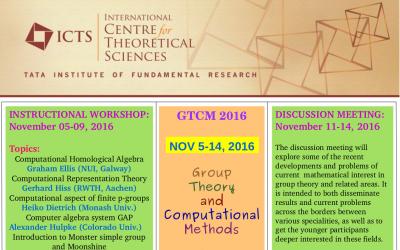Computational techniques are of great help in dealing with substantial, otherwise intractable examples, possibly leading to further structural insights and the detection of patterns in many abstract mathematical fields like finite group theory, combinatorics, homological algebra etc. Computational mathematics has recently emerged as an important area of study and has established itself as a powerful tool, aiding quick maturing of intuition about concrete mathematical structures.
The first part of this program, a 5-day instructional workshop during November 05 - 09, 2016, is an attempt to introduce computational techniques in group theory and related topics to graduate students and young researchers. This activity will consist of five mini-courses:
- Computational Homological Algebra
- Computational Representation Theory
- Computational aspects of finite p-groups
- Computer algebra system GAP
- Introduction to Monster simple group and Moonshine
The plan is to have five hours of teaching, tutorials and guided practical sessions in each mini-course.
The second part of the program, a 4-day discussion meeting during November 11-14, 2016, is an attempt to explore some of the recent developments and problems of current mathematical interest in group theory and related areas. Eminent national and international mathematicians will be presenting their work on a variety of topics. It is planned to provide plenty of time for discussions among the participants. It is also planned to have poster presentations by young researchers to foster their interactions with the senior mathematicians. All the lecturers in the instructional workshop and a majority of discussion meeting speakers will be present during the entire program, providing the participants ample opportunities for interaction and collaboration.
 icts
icts res
res in
in

